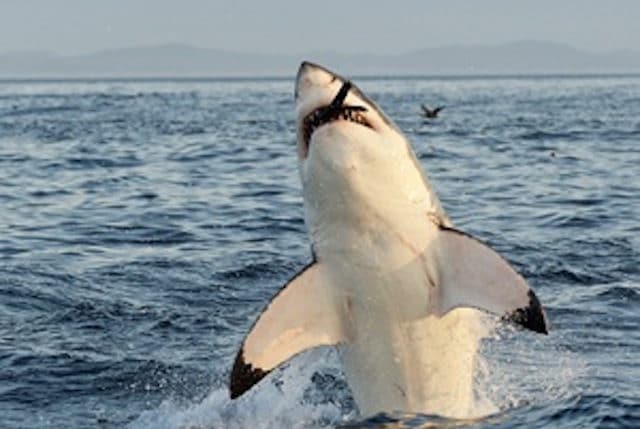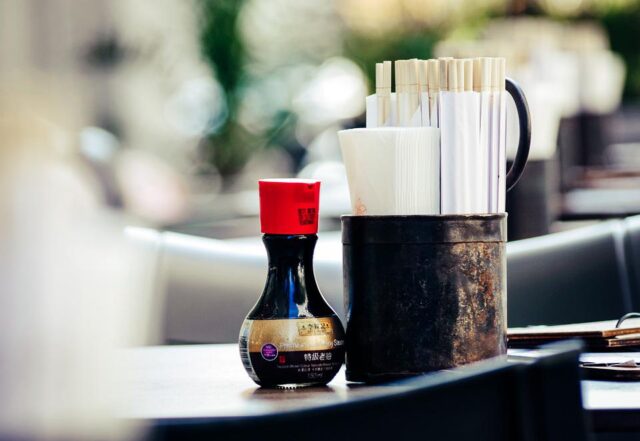They say the English language is one of the hardest to master if it’s not your native tongue, and for good reason. The words we use are a confusing mishmash of what must look like nonsense to non-native speakers. Why doesn’t laughter rhyme with slaughter? Why does the word “set” have 430 ways it can be used according to the dictionary? You could drive yourself mad trying to figure it out. Even looking at word origins can be puzzling, since so many words don’t come from where you might think.
10. Loan Sharks are Not Named After the Sea Creatures

A loan shark sounds potentially dangerous even if you have no idea what the term means. And once you do know, it still sounds dangerous. In simple terms, a loan shark is someone who will lend you money with very unfavorable terms. There could be high interest rates or dangerous penalties for not paying it back on time. Usually this means something illegal, like maybe they break your legs. You want to avoid a loan shark.
The relationship with sharks seems obvious. A shark is a predator in the sea, a loan shark is like a financial predator. Weirdly enough, that is not where a loan shark gets its name. They have nothing to do with sea creatures and, if anything, the animal called a shark shares the name only by coincidence.
Once upon a time, sharks were actually called sea dogs. There are still species we call dog fish that are small sharks. But loan sharks get their name from shark which has long meant a deceitful or dishonest person. That name predates sharks of the sea and may come from Dutch or German origins, such as the word “schorck” meaning scoundrel.
9. Barnacles were Named after Geese

If you know much about boats, then you know about barnacles. These little crustaceans form on the hulls of ships as well as rocks and pretty much anything else in the water, and can build up until whatever they’re covering is all but invisible. There are a number of species and some of them are even edible.
In Europe, there’s a bird known as the barnacle goose, which looks a bit like a Canada goose and shares the name not by any coincidence at all.
The geese were not named after the crustaceans, but the opposite happened. Barnacles were named for the geese because back in the day, people thought barnacles were where the geese came from. They were baby geese. Go figure.
The geese are black, white, and gray. Barnacles found attached to wood and other floating debris were attached with a little gray and black foot that looked a lot like the goose’s neck. And that was all it took. This goes all the way back to the 11th century.
8. Cesarean Sections Were Not Named for Caesar

One pervasive and easy to understand etymological myth is that Julius Caesar was the source of what we know today as a Cesarean or C-section. It’s an easy one to believe in since the names are so similar and there’s a common tale that Caesar was born via C-section. Why wouldn’t it be named for him? Well, for one, he wasn’t the first baby born that way by any means, as it was known in Hindu, Chinese, Egyptian and Roman texts, among others. There was even a law on the books prior to his birth about performing them. Plus, it’s likely Caesar was not even born via c-section.
In Caesar’s day, a c-section was most commonly performed to save a baby when the mother had died or was going to die because she likely wouldn’t survive the procedure. But Caesar’s mother lived for many years.
So why the name Caesar? It likely comes from the word caedare, meaning “to cut.” Pliny the Elder even suggested Julius Caesar’s name was actually from an ancestor who had been born via the procedure, meaning he was named for the surgery, not the other way around.
7. Calling Police Five-O Comes From the Show Hawaii Five-O

If you’re hip to the slang of the streets, you know that “Five-O” refers to the police. The question then becomes why? What does Five-O have to do with police in any way? The answer to that is in Hawaii, or at least a fictitious version of it. The TV series Hawaii Five-O dates back to 1968 and was one of the earliest popular police procedurals.
Throughout the ’70s, the term “Five-O” became a popular slang term for police and still survives in some circles to this day. It helps that the series was remade and is still on TV. But unlike some police lingo that makes its way onto TV, including police codes for crimes like the infamous “187” which was allegedly Los Angeles police code for murder, Five-O didn’t mean anything. So the show was the source of the term. It didn’t co-opt it from real police or even pop culture. On the show, it just refers to the division where the police worked at the 50th precinct, also a nod to Hawaii being the 50th state.
6. Soy Sauce is Not Named After Soybeans

The fact that we know soybeans exist and soy sauce exists seems like we know two related things. And it would stand to reason, based on common sense, that soy sauce is made from soybeans and that’s why it’s called soy sauce. But we can’t make assumptions when it comes to the origins of words. Soy sauce is not named after soybeans. Instead, soybeans got their name from soy sauce, which claimed the word first.
Soy sauce traces its roots to China, but the name is Japanese. Soyu or shoyu are the Japanese terms for the sauce which came from the Chinese shi-yu. So does that mean a soybean is a shoyu bean? Not at all. In Japanese, soybeans are daizu.
John Locke wrote about soy sauce, which he translated to Dutch as saio and that evolved over time to soya and then soy. Because Dutch and then English speakers knew the sauce before the bean, the name went backwards and soybeans came from soy sauce.
5. Orange the Fruit was Named Before the Color

There have been many jokes made over the years about the person who first saw an orange growing on a tree and gave it the most uncreative name he could come up with. But rest easy because the story can’t be true. The fruit was not named after the color; the color was named after the fruit.
Orange as a fruit dates back in English to the 1300s. That came from French, which came from Arabic, which came from Persian, which goes all the way back to the Sanskrit word n?ranga, or orange tree.
Incredibly, the color didn’t show up in writing until the 1500s. Prior to that, people likely just referred to anything orange as “yellow-red.” Once the fruit became widely available, it became an easier descriptor. In fact, very few languages actually have a specific term to refer to orange rather than a yellow and red mix.
4. The Canary Islands Are Not Named for the Birds

Canaries are known for a few things such as their yellow color, appropriately known as canary yellow, for singing, and for being used to test the air safety in mines. There’s even an island chain bearing their name, but they’re not named for the birds. The birds were named for the islands. The islands were named for dogs.
The original name for the islands was Insula Canaria, which means “Island of Dogs.” It has the same root as the word canine. The Romans called it the Island of Dogs for unclear reasons. There’s a story that the island’s original inhabitants worshiped dogs. But there’s also the possibility the population of monk seals, which Romans called sea dogs, was responsible. So the birds were essentially named after either dogs or seals.
3. Okay Derived From OK

The word OK gets tossed around a lot in English and even in other languages. You can say OK to express agreement. It’s a solid term for stating how you’re feeling, and it works well with sarcasm and displeasure if your tone is right. But it can get confusing when you consider it exists as OK, as in the letter O and K put together, as well as a four letter word okay spelled o-k-a-y. Why the difference?
Though it’s counter-intuitive, the two-letter version is the original word, such as it is. The four-letter variant came afterward. English is big on abbreviations and contractions so it seems like okay with four letters would have been reduced to the two letter word since, phonetically, they sound the same.
Two-letter OK is thought to be a phonetic abbreviation of “all correct” which could have been rendered as “oll korrect” in a joking way. Around this same time, Martin Van Buren was running for President and used his nickname, Old Kinderhook, in slogans telling everyone to “Vote for OK.”
It would be several decades before four-letter okay arrived on the scene, a phonetic lengthening of the original term.
2. Bikini is Named for the Bikini Atoll

The bikini remains one of the most popular swimsuit designs ever created and it’s nearly 80 years old at this point. Some consider it scandalous, others sexy, but it was designed to make waves when French designer revealed the two-piece back in 1946.Of course there were plenty of two-piece swimsuits or other clothing items long before then – the bikini is little more than a bra and panties after all, but the idea of someone wearing such a thing in public at that place and time in history caused a stir. Plus, it had been given a name people were sure to remember – the bikini.
The swimsuit’s name was not created in a vacuum. It comes from the Bikini Atoll, which had the name long before the two-piece suit came along. The atoll was famous, or perhaps infamous, for nuclear weapons testing. This was the place where 23 nuclear devices were dropped for testing purposes. But at the time of the bikini’s release, those tests had just started, which mean the awesome and terrifying power of nuclear weapons was brand new. No one had ever seen anything like it before and, at the time, no one knew the implications. They just knew it was big. So the bikini capitalized on that entire sense of awe. It was a bombshell of a swimsuit, if you will. Something explosive and never before seen.
1. The Word Escalate Came From Escalators

Nearly every large mall in the world shares a feature you won’t find in many other types of buildings – the escalator. Offices tend to use elevators, as do apartment buildings. But the escalator is fairly limited in scope. An escalator works best in a place with a lot of space and a lot of people. Unlike an elevator, it doesn’t require waiting and doesn’t suffer capacity limits. So it works well in places like malls, or maybe airports and stadiums. And what does an escalator do? It escalates! Sort of.
The name itself indicates it is a device which escalates. The English language works in a way that can help you pick words apart. Something ending in -or or -er is often a noun that shows off a verb action. A runner runs. A driver drives. It’s not a hard and fast rule, but it’s a good guide. And since escalate is a word, it makes sense in this case.
All that being said, the word escalate only exists because of escalators. It traces its origin to 1922 and is a back formation from the word escalator. The word just means to climb or reach by means of an escalator. It is only in recent years that corporate speech has hijacked the word and you’ll find it being used when customer service needs to escalate your concern to a manager. It’s also used to reference tensions that escalate in wartime, and both senses were adapted from just standing on moving steps.